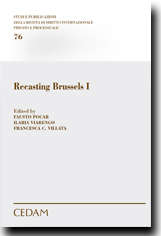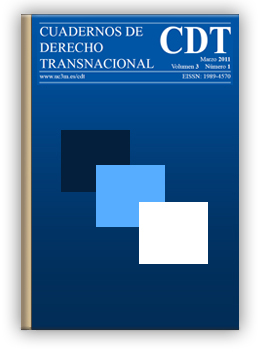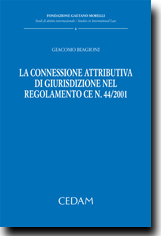The University of Milan will host a two-day conference on 25 and 26 November 2011 on the review of the Brussels I regulation, organized with the University of Padova, the University of Heidelberg and the Ludwig-Maximilians-Universität München: “Cooperazione Italo-Tedesca nella revisione del Regolamento Bruxelles I – Deutsch-Italienische Kooperation im Rahmen der Neufassung der Brüssel I-Verordnung“. The working languages will be English, Italian and German. Here’s the programme (.pdf):
I Session: Friday 25 November 2011, 10h00
Saluti introduttivi – Grußworte: Prof. Dr. Marino Regini (Università degli Studi di Milano); Prof. Dr. Angela Lupone (Università degli Studi di Milano)
Chair:
- Prof. Dr. Rainer Hausmann (Universität Konstanz): L’ambito di applicazione del regolamento – Der Anwendungsbereich der Verordnung;
- Prof. Dr. Andrea Gattini (Università degli Studi di Padova): I rapporti con le convenzioni internazionali – Das Verhältnis zu internationalen Abkommen;
- Prof. Dr. Burkhard Hess (Universität Heidelberg): La competenza in materia di liti patrimoniali- Die Gerichtsbarkeit für vermögensrechtliche Streitigkeiten;
- Prof. Dr. Ruggiero Cafari Panico (Università degli Studi di Milano): Il forum necessitatis – Die Notzuständigkeit (forum necessitatis).
– – – –
II session: Friday 25 November 2011, 14h00
Chair: Prof. Dr. Peter Kindler (Ludwig-Maximilians-Universität München)
- Prof. Dr. Claudio Consolo (Università degli Studi di Padova): La proposta di revisione del Regolamento Bruxelles I e l’arbitrato – Der Vorschlag zur Revision der Brüssel I-Verordnung und die Schiedsgerichtsbarkeit;
- Prof. Dr. Christian Kohler (Universität Saarbrücken) – Prof. Dr. Ilaria Queirolo (Università degli Studi di Genova): Gli accordi di proroga della giurisdizione nella proposta di revisione del regolamento Bruxelles I – Die Gerichtsstandsvereinbarung im Vorschlag zur Neufassung der Brüssel I-Verordnung;
- Prof. Dr. Luigi Fumagalli (Università degli Studi di Milano): La litispendenza – Die Rechtshängigkeit.
– – – –
III session: Saturday 26 November 2011, 9h00
Chair: Prof. Dr. Kurt Siehr (Max-Planck-Institut für ausländisches und internationales Privatrecht, Hamburg)
- Prof. Dr. Marco De Cristofaro (Università degli Studi di Padova) – Prof. Dr. Thomas Pfeiffer (Universität Heidelberg): L’abolizione dell’exequatur – Die Abschaffung des Exequaturverfahrens;
- Prof. Dr. Manlio Frigo (Università degli Studi di Milano): Il riconoscimento e l’esecuzione delle decisioni in materia di diffamazione – Die Anerkennung und Vollstreckung von Entscheidungen bei Verleumdungsklagen;
- Prof. Dr. Stefania Bariatti (Università degli Studi di Milano): Il riconoscimento e l’esecuzione delle decisioni rese a seguito di class action – Die Anerkennung und Vollstreckung von Entscheidungen ergangen aufgrund einer Sammelklage (class action).
– – – –
Round Table: Saturday 26 November 2011, 11h15
Tavola rotonda sull’impatto della revisione del Regolamento sull’ordinamento italiano e sull’ordinamento tedesco – Podiumsdiskussion zu den Auswirkungen der Revision der Verordnung auf das italienische und das deutsche Recht
Chair: Prof. Dr. Fausto Pocar (Università degli Studi di Milano)
- Prof. Stefano Azzali (Camera Arbitrale di Milano)
- Prof. Dr. Sergio M. Carbone (Università degli Studi di Genova)
- Prof. Dr. Herbert Kronke (Universität Heidelberg)
- Prof. Dr. Riccardo Luzzatto (Università degli Studi di Milano)
- Prof. Dr. Alexander R. Markus (Universität Bern)
- Prof. Dr. Marco Ricolfi (Università degli Studi di Torino – Studio Tosetto, Weigmann & Associati)
The event is organized under the patronage of the Italo-German Chamber of Commerce and Chamber of arbitration of Milan, and with the financial support of: Ateneo Italo-Tedesco; Law firm Gebhard (Milan, Stuttgart); Law firm Tosetto, Weigmann & Associati (Turin, Milan, Rome); “Associazione per gli scambi culturali tra giuristi italiani e tedeschi”.
For further information and registration, see the programme and the conference’s webpage.
(Many thanks to Prof. Francesca Villata, University of Milan, for the tip-off)



